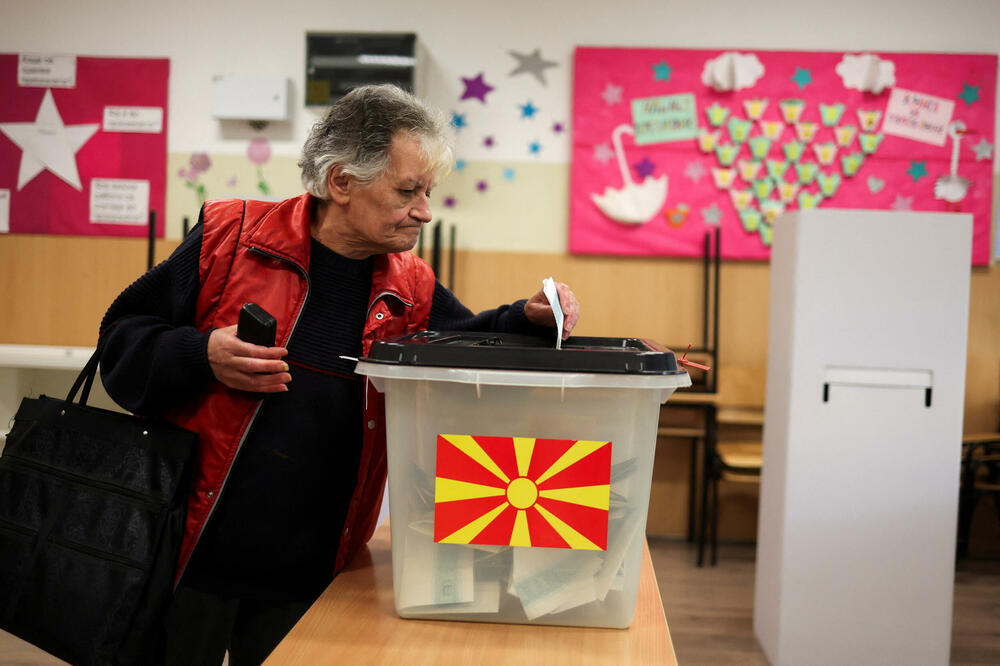At the polling stations in North Macedonia, which opened this morning on April 24 at seven o'clock, citizens began voting for one of the seven candidates for the country's president, which is the largest number of candidates in the history of presidential elections.
Current President Stevo Pendarovski, first on the list of candidates supported by the ruling SDSM, is running for a second term. Again, as in 2019, he is faced with the candidate of the main opposition party VMRO-DPMNE, professor of the Faculty of Law, Gordana Šiljanovska Davkova.
The Albanian block of parties has two candidates. The current head of diplomacy, Bujar Osmani, a doctor by profession, is the candidate of the ruling DUI, and the opposition parties united in the Vredi coalition also proposed a doctor, who is also the current mayor of Gostivar, Arben Taravari.
Minor parties also have candidates for the head of state in these elections. The Left party, which is against NATO and the EU, proposed Biljana Vankovska-Cvetkovska, a professor at the Faculty of Security, then the current mayor of Kumanovo, Maksim Dimitrievski, who founded the new party ZNAM, entered the presidential race, as did his colleague, the mayor of the municipality of Karpoš. Stevco Jakimovski, from the GROM party. He was blacklisted for his involvement in "corrupt acts," the State Department announced on March 18.
The main topic of the pre-election campaign was the accession negotiations with the European Union, which will continue if changes to the Constitution are adopted, which will include the Bulgarian minority in the preamble, along with several other minorities.
We are talking about 3.000 citizens who declared themselves as Bulgarians in the census, and the current Government accepted this condition after Bulgaria vetoed the European integration of North Macedonia. But the parliament did not get a two-thirds majority to vote it.
For the three presidential candidates, changes to the Constitution should be implemented immediately. This is what the current president Pendarovski and the candidates of the Albanian parties Osmani and Taravari are advocating, thus making their participation in the future coalition government a condition.
High censorship
The electoral process stipulates that a candidate must secure a majority of support from registered voters to win the first round. Since no candidate is likely to achieve this, the top two candidates will advance to the second round.
However, in order to be elected in the second round, the candidate must receive the majority of votes and at least 40 percent of the voter turnout. Failure to meet these criteria would require a repeat election.
The two candidates with the most votes will enter the second round, and according to the polls so far, the candidates of the two largest parties, Stevo Pendarovski from SDSM and Gordana Šiljanovska Davkova from VMRO-DPMNE, have the best chances. They faced each other in the second round and in the previous elections in 2019.
1.814.317 citizens have the right to vote for their favorite.
A significant aspect of these elections is the inclusion of citizens who have yet to update their identity documents to reflect North Macedonia's name change under the Prespa Agreement that was reached to end the dispute with Greece. In order to ensure their participation, a law was adopted that allows voting with old documents.
The OSCE Office for Democratic Institutions and Human Rights (ODIHR) opened an Observation Mission in North Macedonia for both the presidential and parliamentary elections, with 375 observers engaged.
Double election on May 8
The decision to hold the second round of presidential and parliamentary elections on May 8 was made in December 2023, following political unrest over constitutional amendments.
This date enables parliamentary elections to be held within their regular schedule and ensures a presidential transition before the end of President Pendarovski's mandate on May 12.
The presidency has significant powers, including representing the state, commanding the armed forces and assigning the mandate to form a government. Since the independence of the country, presidents have been elected directly and only Kiro Gligorov and Đorđe Ivanov have served two mandates.
Bonus video:





